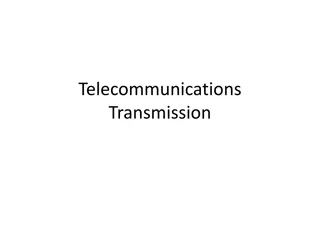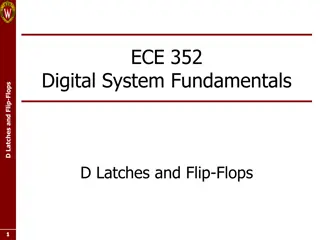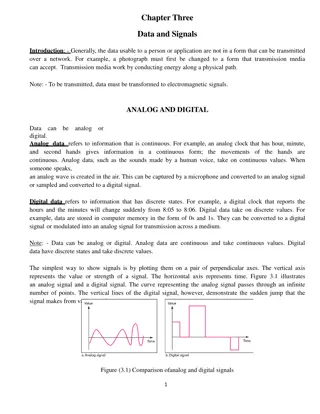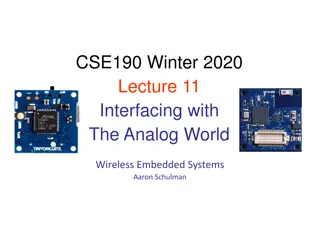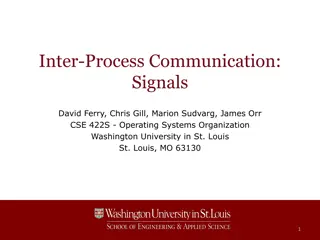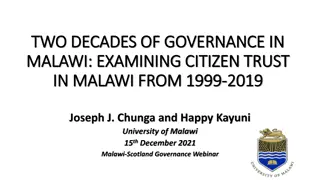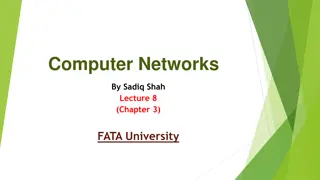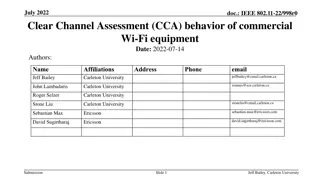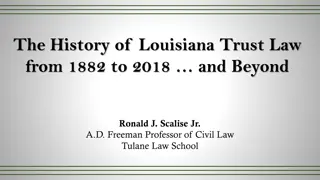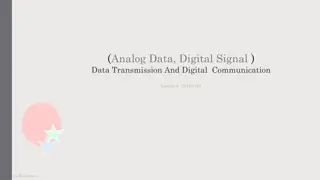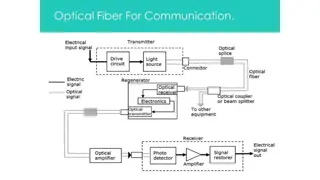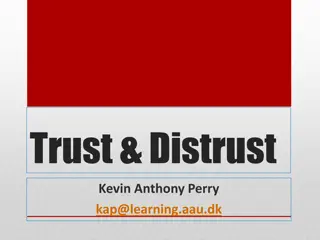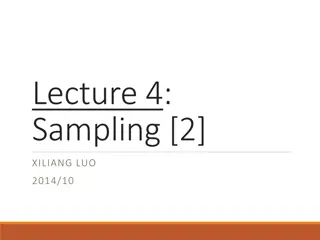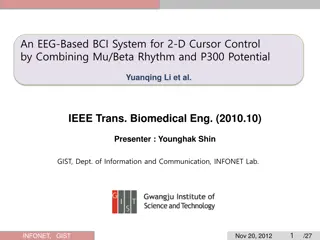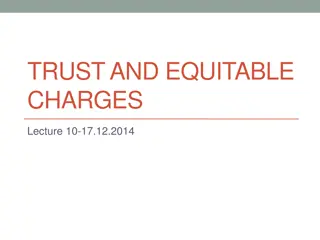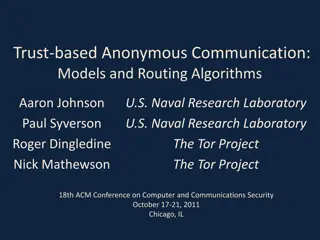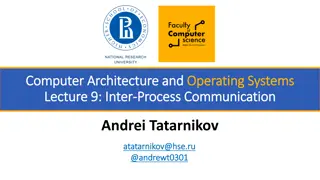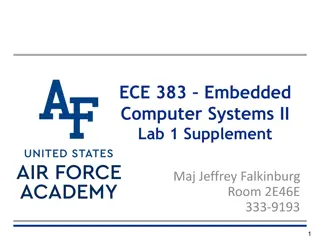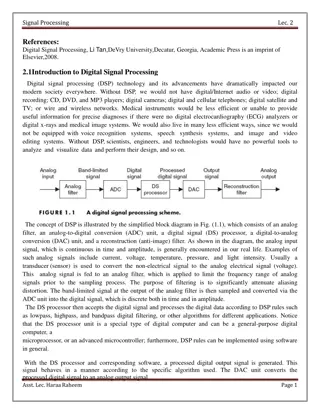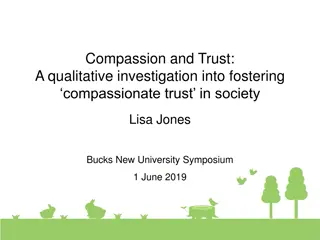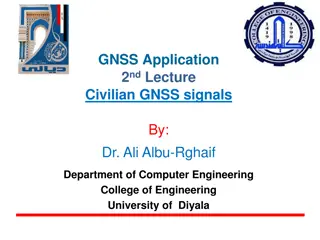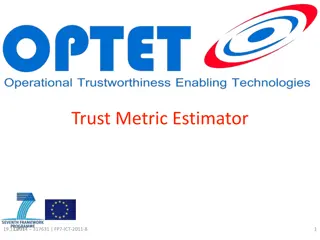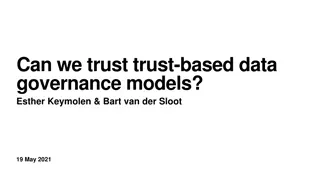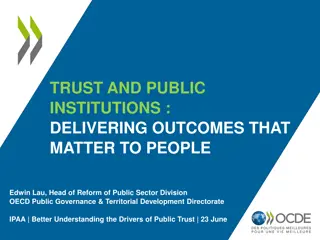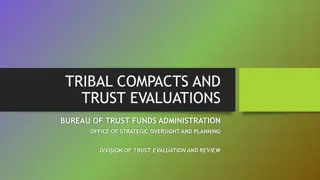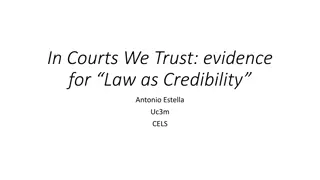Cognitive Load Classification with 2D-CNN Model in Mental Arithmetic Task
Cognitive load is crucial in assessing mental effort in tasks. This paper discusses using EEG signals and a 2D-CNN model to classify cognitive load during mental arithmetic tasks, aiming to optimize performance. EEG signals help evaluate mental workload, although they can be sensitive to noise. The
0 views • 19 slides
Securitization of Covid-19 in Hong Kong: Trust and Success
Analyzing the successful securitization of Covid-19 in Hong Kong amidst low political trust, this study explores the role of trust, smart technologies, and governmental factors in managing the pandemic. Key elements include political trust, audience acceptance, smart technology trust, and effectiven
2 views • 19 slides
Understanding Telecommunications Transmission Systems
Transmission systems in telecommunications provide circuits between network nodes using channels for bidirectional communication. Channels can range from simple audio circuits to complex satellite systems. Signals can be analog or digital, each with its unique characteristics. Bandwidth is crucial f
0 views • 32 slides
Understanding Trust in Contemporary Leadership
Trust is the foundation of effective leadership, comprising elements like integrity, competence, consistency, loyalty, and openness. Trust plays a crucial role in leadership, impacting team performance and cooperation. Different types of trust - deterrence-based, knowledge-based, and identification-
0 views • 9 slides
Understanding D Latches and Flip-Flops in Digital Systems
Digital systems rely on storage elements like D latches and flip-flops to store key information from the past. These structures can hold values of 1 or 0 based on certain control signals, ensuring deterministic behavior. Clock signals are essential for regulating when these storage elements can upda
0 views • 15 slides
Understanding Data and Signals in Networks
Data transmission involves converting information into electromagnetic signals for communication. Analog data is continuous, like a clock's hands, while digital data is discrete, like binary code in computer memory. Signals can be analog or digital, periodic or non-periodic, with characteristics lik
0 views • 17 slides
Interfacing with Analog Signals in Embedded Systems
Exploring the conversion of analog signals from the physical world into electrical signals using transducers in embedded systems. Learn about going from analog to digital representation, choosing sample rates, the Shannon-Nyquist sampling theorem, importance of anti-aliasing filters, and the necessi
0 views • 18 slides
Understanding Inter-Process Communication Signals in Operating Systems
Signals in inter-process communication are asynchronous notifications delivered to specific processes, allowing event-based programming. Processes can handle signal delivery by ignoring it, terminating, or invoking a signal handler. Signal handlers can be written in two ways - one handler for many s
0 views • 21 slides
Examining Citizen Trust in Malawian Governance Over Two Decades (1999-2019)
This paper critically analyzes public trust in key government institutions in Malawi from 1999 to 2019, highlighting a general decline in trust levels and its impact on political legitimacy. The study explores factors influencing public trust, such as perceptions of government performance, integrity
0 views • 12 slides
Understanding Bandwidth and Digital Signals in Computer Networks
Exploring the concept of bandwidth in computer networks, which refers to the range of frequencies in a signal, and delving into the decomposition of signals into simple sine waves using tools. Additionally, the discussion covers digital signals, their representation, and the transmission of informat
1 views • 14 slides
Clear Channel Assessment (CCA) Behavior of Commercial Wi-Fi Equipment
This document, dated July 2022, delves into the Clear Channel Assessment (CCA) behavior of commercial Wi-Fi equipment in response to Narrowband Frequency Hopping (NB FH) signals. It explores the regulatory framework around license-exempt frequency bands in the USA and Europe, highlighting the specif
0 views • 22 slides
Evolution of Trust Law in Malta
Malta, with a unique legal system integrating civil and common law concepts, has evolved its trust law over the years. The concept of trust was gradually adopted, culminating in full integration into domestic law post-2004. Recent amendments have further solidified the legal framework, bridging the
4 views • 150 slides
Leadership, Trust, and Crisis: Lessons from Central Europe Project
The project funded by multiple governments in Central Europe aims to advance sustainable regional cooperation. The initiative focuses on understanding leadership as a process involving trust, especially in crisis situations. The lesson structure includes case studies, discussions on resources, and e
4 views • 19 slides
Louisiana Trust Law Evolution: 1882-2018 & Beyond
Louisiana Trust Law has a rich history from the early resistance pre-1882 to its evolution over the years. Ronald J. Scalise Jr., a prominent figure in Civil Law, explores the challenges faced and the progression of trust recognition in Louisiana. Discover the pivotal moments in the development of t
0 views • 26 slides
Understanding Analog Data and Digital Signal Transmission
This lecture delves into the concepts of analog data, digital signals, and the processes involved in data transmission and digital communication. It covers topics such as Pulse Amplitude Modulation (PAM), Analog-to-Digital Conversion, and Sampling. The conversion of analog signals to digital signals
0 views • 34 slides
Overview of Point-to-Point Fiber Optic Communication System
Point-to-point fiber optic communication systems involve converting voice signals from a microphone into digital signals using a coder, transmitting light signals through a semiconductor diode laser over optical fibers, and decoding the signals back to analog for sound production. The system offers
0 views • 11 slides
Exploring Trust and Distrust in Social Interactions
Understanding the dynamics of trust and distrust within social interactions is vital for successful service delivery and relationship-building, especially in youth work settings. This case study highlights the complexities of gaining trust, the significance of trusting relationships, and the cultura
1 views • 50 slides
TV Ads Signalling Success: Driving Strong Fitness, Trust, and Popularity Signals
TV ads play a crucial role in signaling success by driving strong fitness, social, trust, quality, confidence, and popularity signals among adults. The strength of these signals varies across different media channels, with television emerging as a powerful platform for engaging audiences. Fitness an
15 views • 14 slides
Understanding Sampling and Signal Processing Fundamentals
Sampling plays a crucial role in converting continuous-time signals into discrete-time signals for processing. This lecture covers periodic sampling, ideal sampling, Fourier transforms, Nyquist-Shannon sampling, and the processing of band-limited signals. It delves into the relationship between peri
1 views • 60 slides
Trust Dynamics in AI-Powered Pharmaceutical Business: A Critical Analysis
Exploring the intricate relationship between AI and human trust in the context of the pharmaceutical industry, this presentation delves into the factors influencing trust dynamics and proposes implementation strategies to foster trust between sales representatives and oncologists in AI-supported too
2 views • 12 slides
Deconvolving Snow Cover and Snowfall Passive Microwave Signals
This research focuses on deconvolving snow cover and snowfall passive microwave signals using GPM data. The study employs a data-driven approach to estimate snowfall using a nested K-nearest algorithm and observed irregularities. By analyzing variations in brightness temperatures (Tbs) over snow-cov
0 views • 9 slides
EEG-Based BCI System for 2-D Cursor Control Combining Mu/Beta Rhythm and P300 Potential
Brain-computer interfaces (BCIs) offer a pathway to translate brain activities into computer control signals. This paper presents a novel approach for 2-D cursor control using EEG signals, combining the Mu/Beta rhythm and P300 potential. By simultaneously detecting two brain signals, P300 and motor
0 views • 27 slides
Effective Strategies for Locational Signals in Renewable Energy Projects
Locational signals play a crucial role in steering renewable energy project constructions to specific areas, aiding in grid optimization and resource utilization. Strategies like bid bonuses, penalties, and maximum capacity quotas help manage integration challenges and ensure sustainable deployment
0 views • 17 slides
Understanding Trust and Equitable Charges in Property Law
Trust and equitable charges in property law involve a legal obligation where the property holder manages the property for the benefit of another person. This trust relationship consists of elements like legal title, trust property, and beneficiaries. The creators of a trust can be referred to as set
0 views • 25 slides
Trust-Based Anonymous Communication Models and Routing Algorithms
This research paper discusses trust-based anonymous communication models and routing algorithms in the context of onion routing, emphasizing the importance of trust in mitigating security risks from adversaries with resources. The paper presents a model of trust and proposes trust-based routing algo
0 views • 65 slides
Basis Production Procedure for AGATA through GRETINA Signal Decomposition
This presentation outlines the detailed procedure for generating basis signals in the context of AGATA data processed through GRETINA signal decomposition. It covers the generation of pristine basis signals, superpulse analysis, and the creation of cross-talk corrected basis files. The process invol
0 views • 19 slides
Understanding Inter-Process Communication in Computer Architecture
Explore the key concepts of Inter-Process Communication (IPC) in computer architecture, covering topics such as signals, message queues, shared memory, and handling signals. Learn how to send and handle signals, manage never-ending programs, and control processes using utilities like kill. Dive into
0 views • 20 slides
Embedded Computer Systems Lab 1: VGA Module Overview
This document provides an overview of Lab 1 for Embedded Computer Systems II, focusing on the VGA module and its functionalities. It includes details about the VGA module entity, its ports, clock signals, trigger voltage and time representation, channel signals, color intensities, row and column val
0 views • 18 slides
Volleyball Referee Hand Signals for Common Violations
Learn the essential hand signals used by volleyball referees to indicate common violations during a game. Signals include illegal alignment, line violation, illegal hit, delay of service, over the net, net foul, legal back row attack, illegal attack of serve back row attack, and illegal block/screen
0 views • 26 slides
Trust as a Proxy for Certainty in Social Cohesion
Exploring the intricate relationship between trust, security, and social cohesion, this study delves into how trust serves as a proxy for certainty in uncertain environments. By analyzing societal properties and the role of trust in managing risks and insecurities, the Peace Research Institute Oslo
0 views • 16 slides
Understanding Inter-Process Communication Signals in Operating Systems
Signals in operating systems play a critical role in facilitating asynchronous notifications between processes. They allow for event-based programming and are conceptually similar to hardware interrupts and exceptions. Processes can handle signal delivery by ignoring it, terminating, or invoking a s
0 views • 24 slides
Understanding Digital Signal Processing in Modern Society
Digital Signal Processing (DSP) technology has revolutionized modern society by enabling advancements in areas such as audio, video, communication, medical diagnostics, image processing, and data analysis. This technology involves converting analog signals to digital, applying digital algorithms for
0 views • 4 slides
Cultivating Compassionate Trust in Society: A Qualitative Exploration
This qualitative investigation delves into the concept of compassionate trust and its role in fostering positive societal interactions. Through a social constructionist lens, the study explores how individuals understand and embody compassionate trust, emphasizing the interconnectedness of compassio
0 views • 16 slides
Civilian GNSS Signals Overview: GPS, GLONASS, Galileo
An insightful lecture on civilian GNSS signals by Dr. Ali Albu-Rghaif covers GPS, GLONASS, and Galileo signals. The content delves into GPS signal modulation, generation, receiving, and demodulation processes, highlighting the carrier wave, navigation data, and spreading sequences. It also discusses
0 views • 20 slides
Trust Metric Estimator: Computational Model for Trustworthiness Assessment
The Trust Metric Estimator project aims to create a computational model to estimate user trust levels towards system performance over time. It considers social and technical factors, integrating trust, trustworthiness, and economic aspects to aid decision-making. Research includes surveys to identif
2 views • 8 slides
Trust-Based Data Governance Models and Their Impact on Personal Data Regulation
This article delves into trust-based data governance models, contrasting them with control-based models in the context of personal data regulation. It explores the challenges and benefits associated with both approaches, emphasizing the emergence of new models centered on trust such as data stewards
0 views • 11 slides
Building Trust in Public Institutions: Insights and Strategies
Public trust in government institutions is declining in many OECD countries. Existing measures of trust often reflect leadership approval. Satisfaction with public services plays a crucial role in fostering trust. Investing in trust involves focusing on governance drivers and actions that enhance tr
0 views • 15 slides
Trust Evaluation Process in Tribal Compacts and Trust Funds Administration
Trust Evaluations are mandated under the Tribal Self Governance Act for Tribes engaging in trust programs. The Bureau of Trust Funds Administration conducts these evaluations, focusing on compliance with federal laws and safeguarding trust assets. The process includes questionnaires, reviews, and re
0 views • 13 slides
Trust Dynamics in Political Relationships: Evidence and Implications
Exploring the intricate dynamics of trust between Principals and Agents in political relationships, this study delves into the implications of mistrust and the shift in trust levels over time. Utilizing surveys on political trust and data on trust in governmental branches, the analysis sheds light o
0 views • 22 slides
Edkaagmik Nbiizh Neyaashiinigamiingninwag Trust Overview
Edkaagmik Nbiizh Neyaashiinigamiingninwag Trust, established in 2012 by Chippewas of Nawash Unceded First Nation Coldwater Trust, aims to benefit the First Nations community through various initiatives such as land acquisition, education advancement, and cultural preservation. The Trust is managed b
0 views • 15 slides


